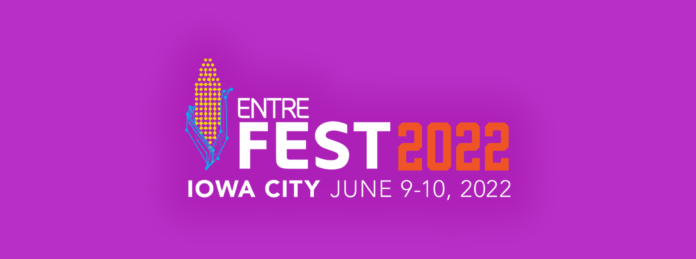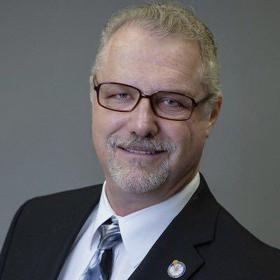
Iowa City will be the hub for entrepreneurship in the state this week during EntreFEST, a two-day conference and networking event.
Several kickoff festivities took place June 8 but the major keynotes and demonstrations will occur June 9 and 10. Attendees will listen to presentations and receive one-on-one advice from experts at spots around town including Graduate Iowa City, MERGE, The Englert Theatre, FilmScene and more.
“It’s always been a neat, annual pilgrimage because you end up with entrepreneurs, intrapreneurs, students, educators and community builders coming together,” said 1 Million Cups Midwest Regional Representative Ben McDougal. “It’s an action packed couple of days.”
Topics include neurodiversity in the workplace, the Great Resignation, product development, personal branding, scaling a startup, how to pitch to investors, copywriting and more.
 The CBJ spoke with Iowa EdTech Collaborative Director Mark Butland to learn more about a panel he is leading entitled EdTech in the Connected Era. The overview of the discussion will be centered around the concept of the classroom of the future, says Mr. Butland. The goal of the panel is to reach entrepreneurs hoping to learn more about the space, as well as educational professionals curious about the future.
The CBJ spoke with Iowa EdTech Collaborative Director Mark Butland to learn more about a panel he is leading entitled EdTech in the Connected Era. The overview of the discussion will be centered around the concept of the classroom of the future, says Mr. Butland. The goal of the panel is to reach entrepreneurs hoping to learn more about the space, as well as educational professionals curious about the future.
Blockchain credentialing
Butland: “Blockchain credentialing will be one of those major disruptors that we’ll be hearing about for the next three to five years. Instead of there being a transcript from high school that shows a person is a graduate, more and more employers would rather see someone who has demonstrated mastery of skills. For example, if I have someone who took high school calculus, I can see someone got an A in the class, but does that tell me the same thing as putting a piece of chalk in their hand and asking them to work on an equation?
The blockchain is a way for an individual to collect and hold these credentials as evidence of mastery and they go with an individual, sort of like your resume, but it’s kept in blockchain technology. That allows you to collect and always retain ownership of credentials. There’s a lot of money and research going into this.
As you can imagine, it’s controversial because colleges and universities have a lot at stake here. If you can suddenly get what you want from Coursera (an online, open course provider), suddenly a four year degree is less important. Colleges want to push back on that, but the thing is, it’s already happening, right? IBM already will hire you based on credentials, regardless of whether you have a four year degree or not.”
Emergence of AI
Butland: “Another disruptor is AI. We’re using artificial intelligence to better understand learners and then predict what they need to provide them targeted help.
But there are some challenges with that.
How accurate is the algorithm? If it’s based on a majority, does it do a disservice to a minority population and fuel an inequity gap?
What happens to the data we’re collecting? Does the student retain ownership of all this personal information about how they learn, does the school keep it or does the company that’s providing the data keep it?
There are a whole lot of issues we want to work out, and the key is to work them out ahead of a lot of this being implemented.”
Mental health and student safety
Butland: “There was a study out of Austin, Texas where students were five times more likely to communicate that they felt unwell to an app rather than to a human counselor, teacher or parent. Mediated communication adds a layer of anonymity and perceived safety.
EdTech has the opportunity to leverage insights to make our schools safer. There are a number of companies moving in that direction.
Some companies are focusing on bringing more psychological help to rural communities where they may not be able to afford to have a school psychologist. Other companies are focused on mitigating risks and giving extra attention to students showing signs of being unwell in risk categories. Again, that personal data can be really intrusive. But when lives are at stake, I think we can make a case it is worth it if we do this well.”
Answers were edited and condensed for space.




